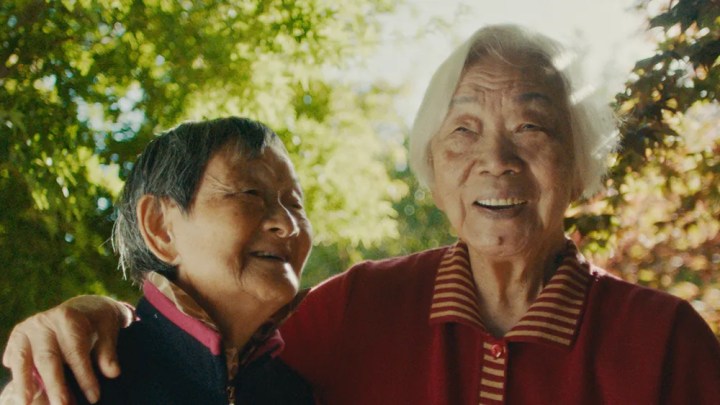
What “Nǎi Nai & Wài Pó” can teach about combatting loneliness as we age
Share Now on:
What “Nǎi Nai & Wài Pó” can teach about combatting loneliness as we age

We’re watching the 2024 Oscar-nominated documentary shorts in March. This week, inspired by “Nǎi Nai & Wài Pó,” — available to stream on Disney+ with a subscription — we delve into the costs of loneliness while aging in place.
The Oscar-nominated short doc “Nǎi Nai & Wài Pó” is one part “Grey Gardens,” one part “Golden Girls.” Like the fictional characters on the 1980s television sitcom, Yi Yan Fuei (Nǎi Nai) and Chang Li Hua (Wài Pó) are best friends who become roommates later in life. They share a bed, make music together, arm wrestle and complain about each other’s farts. As their grandson, filmmaker Sean Wang, shoots scenes for his documentary, they revel in the idea that they will become famous movie stars.
The film, which Wang shot early in the COVID-19 pandemic, weaves these humorous moments with more sober and sincere tales. His maternal and paternal grandmothers, who were born in Taiwan but now live in Northern California, reflect on what makes life worth living as they get older. The octogenarian and nonagenarian have experienced hardships, including the deaths of friends and family, and they know that they too will die sooner rather than later. Yet, they choose to remain hopeful.
“The days we spend feeling joy and the days we spend feeling pain are the same days spent. So, I’m going to choose joy,” Yi said during the film.
Living together has provided Yi and Chang with companionship that they lost after their husbands died. But not all Americans are so lucky to find new connections as they age. A growing share of older people in the U.S. are living alone, which has implications for their health and the economy.
Loneliness and isolation are more than just sad feelings. A lack of social connection carries a risk of premature death similar to that of obesity or smoking 15 cigarettes per day, according to the U.S. surgeon general’s 2023 advisory report. Surgeon General Vivek Murthy described loneliness and social isolation, two related but distinct conditions, as an epidemic, costing the U.S. economy billions of dollars each year.
Although loneliness and social isolation affect people of all ages, older people are at higher risk because of shrinking social networks, physical decline and lower incomes, which can exacerbate social disconnection. Living alone is another key factor.
Few economists have evaluated the cost-effectiveness of combating loneliness. It’s an underresearched area, but figuring out what works may only become more urgent as the U.S. gets older and grayer. Demographers estimate that people 65 and older will make up nearly a quarter of the population by 2054.
Despite the popularity of the “Golden Girls” and stories of real-life friends who move in together in their twilight years, less than 2% of seniors lived with a nonrelative last year, according to Census Bureau data.
Most older folks would prefer to age in place, even when it’s not practical or financially feasible to live alone. But home sharing, like that featured in “Nǎi Nai & Wài Pó,” could offer more older Americans the ability to stay in their homes while reducing the risks of social isolation. Intergenerational home sharing, in which seniors find roommates from younger generations who provide support around the house in exchange for lower rent, can create benefits in terms of companionship.
Do you wonder how lonely you are? Take this quiz to find out.
Next week
Since April has five Mondays, we’ll talk about one more short, “Island in Between,” in our April 1 newsletter. We’ll also announce our focus for the rest of the month! See you then.
Here are links to all the other nominated short films:
- “Nǎi Nai & Wài Pó,” available to stream on Disney+, with a subscription,
- “The ABCs of Book Banning,” available on Paramount+, with a subscription
- “The Barber of Little Rock”
- “The Last Repair Shop”
There’s a lot happening in the world. Through it all, Marketplace is here for you.
You rely on Marketplace to break down the world’s events and tell you how it affects you in a fact-based, approachable way. We rely on your financial support to keep making that possible.
Your donation today powers the independent journalism that you rely on. For just $5/month, you can help sustain Marketplace so we can keep reporting on the things that matter to you.


















